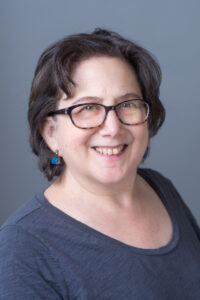
Peer Grief Helper Profile: Amy Horowitz
By Kerry J. Bickford, VOICES Editor
Amy Horowitz was about to launch her first peer grief support group on March 23, 2020, when the COVID-19 pandemic exploded, and face-to-face meetings came to a screeching halt. This presented a critical moment for people who had suffered the death of a loved one from substance use and were desperate for community, so Amy and her co-facilitator, Laurie Loisel, decided to move forward despite the challenges. They quickly shifted gears and arranged for the meeting to take place on Zoom -- never missing a beat.
Amy’s passion for supporting people who have suffered such a loss comes from losing her nephew, the oldest son of her brother and his wife. Amy described her nephew as a “self-taught whiz -- a maverick” at restoring old cabinet radios and rebuilding computers. His challenge with learning difficulties sensitized him to others’ struggles, and he developed a strong distaste for injustice. He was motivated to take political science classes to pursue a possible career in law. He also filed --and won-- a pro se case in New Jersey that helped people with Hepatitis C who are not covered by insurance receive Harvoni treatment.
Despite his remarkable abilities, substance-use disorder led to a series of personal and legal difficulties which rearranged his future. A single dad, he moved in with his parents to help raise his young son. He tried pulling his life together and had just signed his first insurance claim in a family-owned business when his mother found him in his room one morning and couldn’t awaken him. He had died of a mixed cocaine-fentanyl overdose sometime in the previous night at the age of 27.
Amy describes feeling a “deep, profound grief” in the days, weeks, and months that followed. She felt far away geographically from her brother and sister-in-law. Her grief was hard on her spouse and children, perhaps because they did not have the same lifelong connection she felt as a devoted aunt. Her nephew was the oldest of his generation, and she saw him as “the carrier of memories” and grieved the loss of what was and of what would never be. She also felt confused about her place in the world of grief, where the boundaries are not easy to identify.
One of the first things Amy decided to do was recite the Kaddish, the Jewish prayer of mourning, weekly in prayer services for eleven months minus a day to honor her nephew’s life. While the parents typically do this, Amy took it on, allowing his parents to grieve and focus on their grandson -- who had just lost his father. She did her best to support the family long distance and helped with some of the business tasks related to her nephew's death. She also linked them to the leaders of a local GRASP meeting where they continue to receive good support.
At the same time, she signed up for a continuing education class on complicated grief -- and began attending harm-reduction meetings in Northampton -- where she embraced the spirit of no stigma. While all of this was helpful, Amy still struggled with grieving in a society that expects us to pick ourselves up, dust ourselves off, and move on within a certain time. She also struggled with her role as a bereaved aunt and how little support there is for extended family members like her.
Amy felt driven to search for ways to do something positive in her nephew’s memory. She wrote poetry and began to support a local group that provided complementary herbal medicine, massage, and Reiki to people in early recovery through the People’s Medicine Project. She attended a two-day SADOD training, How to Facilitate a Peer Support Group for Grief after a Death from Substance Use, and this was a turning point. It provided the inspiration she had been searching for and connected her with like-minded people who understood there are no boundaries or timelines when mourning the loss of a loved one. She felt a calling to be somewhat of an ambassador of grief and found her landing place among a network of peer grief helpers. Soon after, Amy joined forces with Laurie in an outreach mission through the Northampton District Attorney’s office to offer a peer grief support group for adults who have lost a loved one to overdose.
Amy Horowitz is a gentle, compassionate aunt who has found a way to carry her beloved nephew with her despite the barriers created by a ‘’grief intolerant society.” But in a world where grief is universal -- we cannot escape it -- Amy has learned how to tolerate and even embrace grief because it’s what is left behind when we love someone fiercely, the way Amy loved her nephew.
